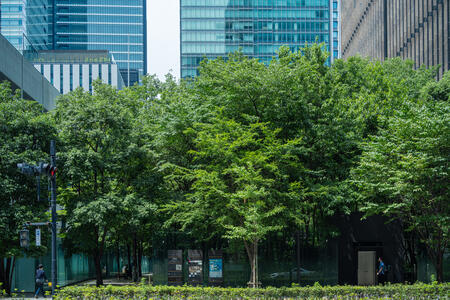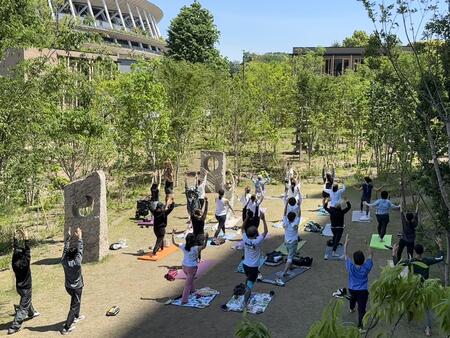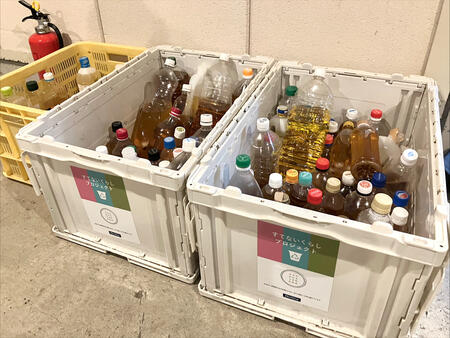Tokyo Tatemono Endorses TNFD Recommendations and Implements TNFD-Based Information Disclosure
Tokyo Tatemono Co., Ltd. (Head Office: Chuo-ku, Tokyo; Representative Director, President & Chief Executive Officer: Katsuhito Ozawa; hereinafter, “Tokyo Tatemono”) announces that it has endorsed the recommendations of the Taskforce on Nature-related Financial Disclosures (hereinafter, “TNFD”)*1, registered as a TNFD Adopter*2, and implemented information disclosure based on TNFD recommendations.
Tokyo Tatemono Group has established commitments in its Group Environmental Policy, including working toward a vision of climate change prevention that leads the community, creating a pleasant city and life with greenery, and engaging in resource-saving activities that are kind to the Earth. Additionally, we have recognized coexistence with the Earth and the environment as one of our shared values with society that we seek to realize through the Group’s business activities, and have identified the promotion of a decarbonized society and a recycling-oriented society as Material Issues to be addressed in achieving this vision.
Going forward, we will continue to promote various initiatives related to the conservation and creation of natural capital and biodiversity.
For details on information disclosure based on TNFD recommendations, please visit the Tokyo Tatemono corporate website. https://tatemono.com/english/sustainability/tnfd-info.html
Specific Initiatives by Tokyo Tatemono Group to Date
Development of Otemachi Forest at The Otemachi Tower (Natural Capital and Biodiversity Creation)

• Developed Otemachi Forest, a green space covering about one-third of the entire site (approx. 3,600 m2).
• Adopted a “pre-forest” method, spending about three years cultivating trees and plants in a mountain forest of Kimitsu City, Chiba Prefecture, before transplanting the soil and vegetation to coincide with the building’s completion. Since then, management has been carried out in a way that closely resembles natural forest practices, aiding in the development of an ecosystem network throughout the region, including surrounding green spaces such as the Imperial Palace Outer Garden.
• Received numerous certifications and evaluations, including ABINC Certification*3, SEGES (Social and Environmental Green Evaluation System) Urban Oasis 2015*4 certification, Nationally Certified Sustainably Managed Natural Sites*5 certification, and TSUNAG (Certification System for Securing Quantity and Quality Urban Green Space)*6 highest-level Triple Star certification.
Initiative details: https://tatemono.com/communication/brand/ootemachi.html (Japanese only)
Development of Forest of Pride at Meiji Park (Natural Capital and Biodiversity Creation)

• First metropolitan park to utilize Park-PFI (Private Finance Initiative).
• Developed Forest of Pride covering about half of the entire site (approx. 7,500 m2), planting around 700 evergreen and deciduous trees of about 60 species.
• Promoted “half-made forest development” that takes time to cultivate together with Tokyo residents, including the establishment of soil environments where ecosystems become active by spreading fallen leaves and other materials.
Initiative details: https://tatemono.com/communication/insight/project/project_10.html (Japanese only)
Implementation of the Waste Not Life Project (Natural Capital and Biodiversity Conservation)

• Launched the Waste Not Life Project in 2024, primarily in for-sale condominiums, contributing to the realization of a recycling-oriented society through various waste reduction efforts, including the collection of waste cooking oil as well as clothing and miscellaneous small goods.
• For waste cooking oil, which can be recycled into fertilizer, feed, soap, and SAF (aviation fuel) through proper processing, installed collection boxes in condominium common areas to facilitate collection with minimal burden on residents.
Initiative details: https://tatemono.com/doforsustainability/dfs/post24.html(Japanese only)
Promoting Resource Recycling through the Use of Recycled Water (Natural Capital and Biodiversity Conservation)
• Actively introducing equipment in buildings above a certain scale that can treat rainwater and miscellaneous wastewater from tenant kitchens into gray water within the building.
• Recycled water that is processed into gray water is reused for purposes such as toilet flushing and watering exterior landscaping.
- 1: An international organization established with the purpose of building a framework for appropriately assessing and disclosing corporate risks and opportunities related to natural capital and biodiversity. It published its final recommendations in September 2023, outlining a disclosure framework that organizes recommended disclosure items along the framework of “Governance,” “Strategy,” “Risk and Impact Management,” and “Metrics and Targets.” In the Strategy section, it recommends assessing and disclosing dependencies and impacts on nature, as well as nature-related risks and opportunities, in accordance with the LEAP Approach developed by the TNFD.
- 2: Companies and organizations that have registered their intention to disclose information in accordance with TNFD recommendations on the TNFD website.
- 3: A system that evaluates and certifies biodiversity conservation efforts in land use for office buildings, housing complexes, etc., using the “Association for Business Innovation in harmony with Nature and Community® Promotion Guidelines” and “Land Use Score Card®” created by the Japan Business Initiative for Biodiversity (JBIB) as certification standards.
- 4: One of the certifications under SEGES (Social and Environmental Green Evaluation System by the Organization for Landscape and Urban Green Infrastructure, which visualizes the social and environmental value of green spaces), a system that certifies efforts to provide comfortable and safe urban green spaces.
- 5: One of the Ministry of the Environment’s policies toward achieving Japan’s 30 by 30 target (the goal of effectively conserving at least 30% of land and sea areas as healthy ecosystems by 2030). A system whereby the Ministry of the Environment certifies areas where biodiversity conservation is achieved through private sector initiatives and other efforts.
- 6: A system established under the Urban Green Space Conservation Act in which the Minister of Land, Infrastructure, Transport and Tourism evaluates and certifies corporate and other efforts to secure high-quality green spaces from the perspectives of quality—such as climate change countermeasures, biodiversity conservation, and well-being improvement—and quantity of green spaces.
Note: This document has been translated from a part of the Japanese original for reference purposes only. In the event of any discrepancy between this translated document and the Japanese original, the original shall prevail.



